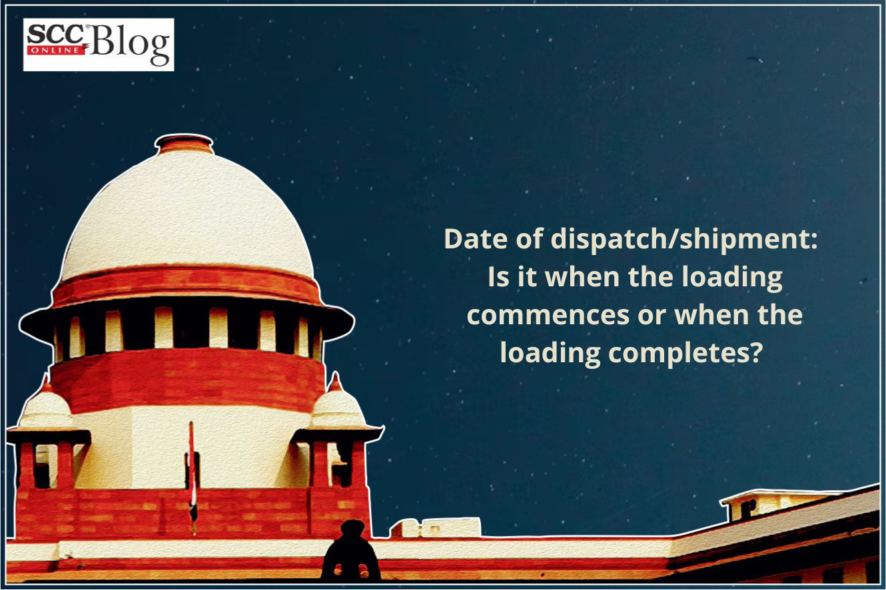Supreme Court: The 3-judge Bench comprising Uday Umesh Lalit, S. Ravindra Bhat*, Pamidighantam Sri Narasimha, JJ., reversed NCDRC’s findings where it had relied on third-party DGFT Guidelines to interpret the date of ‘despatch/shipment’ in the Single Buyer Exposure Policy of the respondent, and thereby deny the appellant’s claim.
The respondent had treated the date on which loading commenced as the date of despatch/shipment’ to reject the appellant’s insurance claim. Deciding the case in favour of the appellant, the Court held,
“The term ‘despatch’ contained in the policy implied ‘completion’ of handing over of possession of the goods to the first carrier (the ship), and not the date on which the loading ‘commenced’ such an interpretation would give rise to an absurdity.”
Factual Matrix
The appellant was an exporter of fish meat and fish oil, who had obtained an insurance cover of ₹ 2.45 crores for foreign buyers’ failure to pay for goods exported from Export Credit Guarantee Corporation Ltd. (ECGC), a government company (under the control of the Ministry of Commerce and Industry, Union Government). ECGC provides a range of credit risk insurance cover to exporters.
The vessel (Tiger Mango Voyage 62) set sail on 15-12-2012. The Bill of Lading was prepared on 19-12-2012, with a line specifying the date of ‘onboard’ (i.e., date on which vessel commenced loading the goods in question on board) as 13-12-2012. The vessel delivered the goods on 22-01-2013, however, the overseas buyer defaulted on payment which gave rise to the appellant’s claim lodged with ECGC on 14-02-2013.
ECGC rejected the appellant’s claim stating that since the date of ‘despatch/shipment’ was not clearly defined in the policy, reliance was to be placed on the definition contained in the Directorate General of Foreign Trade (DGFT) Guidelines. As per which, for containerized cargo, the date of ‘despatch/shipment’ was to be interpreted as the date of ‘Onboard Bill of Lading’, which was 13-12-2012, i.e., a day prior to the effective date of the Policy, i.e., 14-12-2012. Therefore, ECGC reasoned that the appellant was not entitled to the claim amount.
The appellant, feeling aggrieved, complained of deficiency of service, and approached the NCDRC for compensation. By the impugned order, NCDRC upheld the rationale of the ECGC and rejected the appellant’s claim.
Analysis and Conclusions
Common Business Sense
Rejecting the interpretation of the terms ‘despatch/shipment’ as construed by ECGC, the Court opined that in event of confusion the disputed terms need to be interpreted in a common business sense. The Court stated,
“The date of loading goods onto the vessel, which commenced one day prior to the effective date of the policy, is not as significant as the date on which the foreign buyer failed to pay for the goods exported, which was well within the coverage period of the Policy.”
Reliance was placed by the Court on Peacock Plywood (P) Ltd. v. Oriental Insurance Co. Ltd., (2006) 12 SCC 673, to hold that while interpreting insurance contracts, the risks sought to be covered must also be kept in mind. Further, the Court opined that the date of loading the goods onto the vessel was immaterial to the purpose for which the policy was taken by the appellant. The Court noted,
“A plain reading of the policy in question demonstrates that it was taken to protect against failure of the foreign buyer in paying the Indian exporter for goods exported. It was not a policy taken to cover in-transit insurance, and the cause of action triggering the claim arose much later, i.e., on 14.02.2013, well within the coverage of the policy.”
Interpretation of Despatch/Shipment
The Court opined that on harmoniously construing the documents of the policy, it is, in fact, the date on the Bill of Lading, and not the Mate’s Receipt/date of shipment which ought to be considered as the date of ‘despatch/shipment’, for the Bill of Lading is the legal document conferring title and possession of the goods to the carrier. Therefore, the Court held that reliance on the DGFT Guidelines to disallow the claim of the appellant was not good in law.
Further, the Court observed that even if the third-party DGFT Guidelines were to be applied, it would not favour the ECGC, as a plain reading of provision 9.12 of the guidelines shows that the date on the Bill of Lading has to be considered as the date of despatch/shipment.
Conclusion
In the backdrop of above, the impugned order of the NCDRC was set aside; the appellant’s complaint was consequently allowed. ECGC was directed to pay the claim amount of Rs. 1,96,38,400/- crores to the appellant, with interest at the rate of 9% p.a.
[Haris Marine Products v. Export Credit Guarantee Corpn. Ltd., 2022 SCC OnLine SC 509, decided on 25-04-2022]
*Judgment by: Justice S. Ravindra Bhat
Appearance by:
For the Appellant: Ms Anjana Prakash, Senior Advocate
For the ECGC: Mr Rajnish Kumar Jha, Advocate
Kamini Sharma, Editorial Assistant has put this report together






